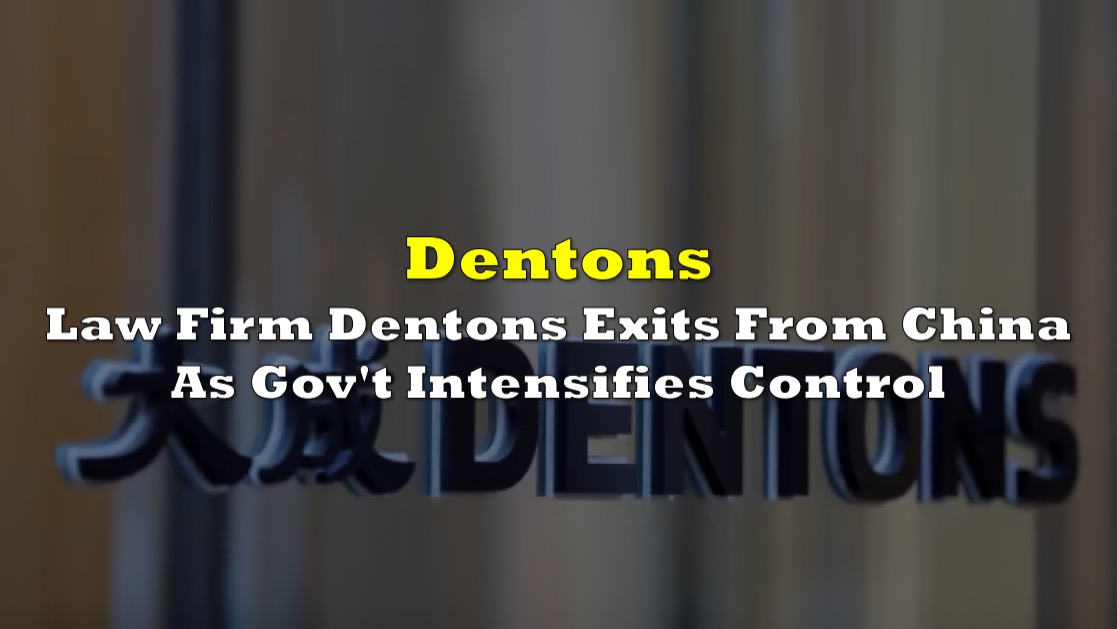Dentons, the global law firm, has made the decision to sever its ties with its Chinese affiliate Dacheng amidst mounting challenges.
Months prior to this move, Dentons had advised its staff in western countries against traveling to China due to difficulties encountered by some professionals in leaving the country. These individuals had faced significant delays upon departure, prompting Dentons to rethink its policies. Chinese authorities had also conducted multiple visits to Dacheng sites, contributing to Dentons’ strategic shift.
The decision to disengage from its Chinese counterpart was communicated to clients in a discreet manner. Citing new mandates pertaining to data privacy, cyber security, capital control, and governance, Dentons explained that it would formally end its association with Dacheng. This shift, while assuring clients of a smooth transition and continued collaboration with Dacheng, implied a shift in the landscape for global law firms operating in China.
Dentons’ withdrawal carries implications beyond its immediate sphere. The firm, which had initially championed Chinese integration through its merger with Dacheng in 2015, is now confronted with the necessity of undoing one of the most significant law firm mergers. The decision reflects Dentons’ inability to navigate the evolving regulatory environment in China, particularly the expanded anti-spying rules that restrict the sharing of information between Chinese and non-Chinese partners.
2 of 2
— Dan Harris (@danharris) August 8, 2023
This is why you so often “feel” like the opposing party in your China transaction knows your next move. It’s because they probably do!
As a consequence, the firm faced constraints in performing essential functions such as conflict of interest checks and due diligence for China-related deals. The altering ground rules in China made it increasingly challenging for Dentons to uphold its commitment to client confidentiality.
This move by Dentons reverberates across the legal industry, prompting speculation about whether other firms will follow suit. Some have already taken steps in this direction. Proskauer Rose announced the closure of its mainland China office, and Ropes & Gray is reallocating resources from China to Hong Kong. This trend might signal a larger shift as firms grapple with the complexities of conducting business in China under changing circumstances.
While Dentons attributes its decision to regulatory concerns, dissenting voices within the legal community suggest deeper issues. Some insiders argue that the merger between Dentons and Dacheng had always been fraught with challenges due to cultural differences, conflicts of interest, and the sheer size of the combined entity. These underlying issues are now coming to the fore as Dentons’ departure raises questions about the viability of such large-scale mergers.
Despite this shift, there are firms that continue to expand their presence in China. Morgan Lewis recently established an office in Shenzhen, while HFW added to its presence in the Greater Bay Area. Others have opted for formal cooperation agreements with Chinese firms, adapting to the changing landscape while maintaining a presence in the market.
The context of Dentons’ decision is set against a backdrop of broader economic challenges in the region, compounded by geopolitical tensions affecting cross-border transactions. The Biden administration’s recent move to limit investment in certain sectors in China underscores the evolving policy dynamics that firms must contend with.
Information for this briefing was found via Financial Times and the sources mentioned. The author has no securities or affiliations related to this organization. Not a recommendation to buy or sell. Always do additional research and consult a professional before purchasing a security. The author holds no licenses.









